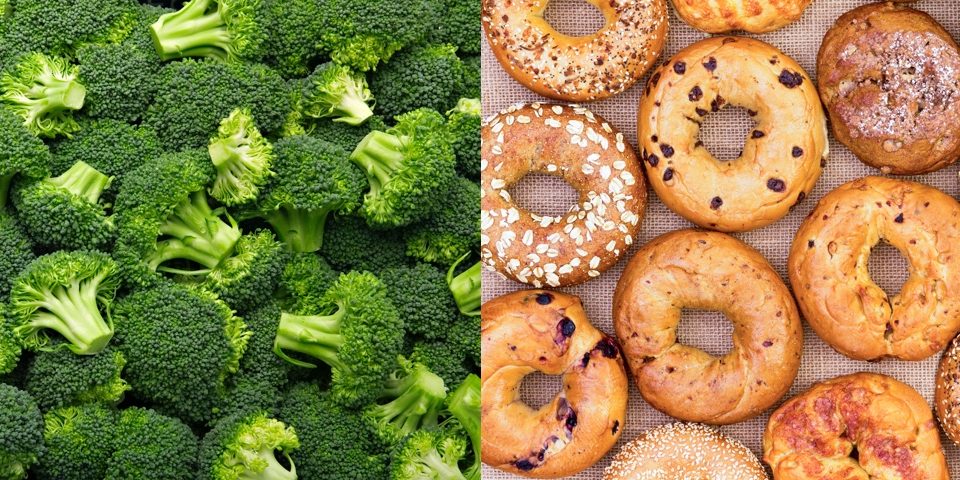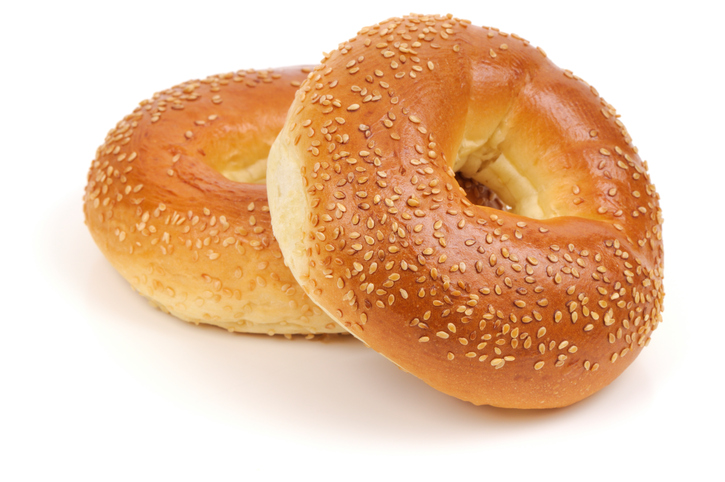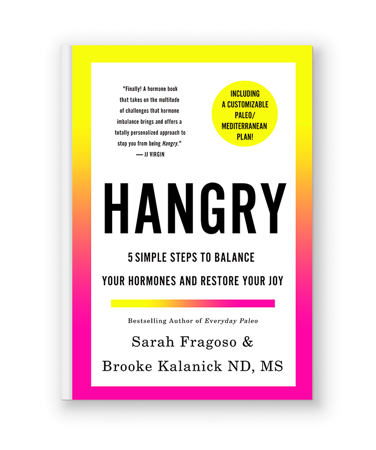
Don’t eat broccoli or it’s Brassica family cousins! They shut down your thyroid! Likely you’ve heard this advice shouted from some article headline or espoused by many an expert or even your well meaning next door neighbor. It is a popular opinion on the web to say the least.
And while it is true that these Brassica family veggies -like many other foods in our diet – can influence iodine metabolism, the notion that a bit of broccoli in your stir-fry is “shutting down” your thyroid, as pervasive as it is, is kinda nuts. What’s more, it’s kinda useless.

We want so badly to be good to our bodies, to do the right thing, to eat “healthy”; but the nutrition strategies we implement should be making a significant impact on our health. Otherwise why bother? Let’s face it, it takes time, energy, money and dedication to eat well – which is why I counsel my patients to commit to the changes that will make the biggest impact.
Broccoli vs. Bagel is a great example of this.
The reason broccoli, Brussel sprouts and other Brassica family veggies make the thyroid no-no list is because they contain compounds called goiterogens. They get this comic book villain type name because a goiterogen causes a goiter (an enlarged thyroid gland). (If you really want to hone your thyroid nutrition check this out.)
Soy is also a goiterogen and makes the “bad for your thyroid” list. A goiterogen is a drug, chemical or food compound that disrupts the normal production of thyroid hormone by blocking the thyroid from taking in iodine. (Thyroid hormone is made up of the amino acid tyrosine and 4 or 3 molecules of iodine, hence the thyroid hormone names of T4 and T3). If this iodine blocking process is going on in your thyroid, it will begin to swell causing a goiter.
There are various causes of goiter; in this case we’re talking about a non-toxic goiter that is swollen, but not overproducing hormones (aka toxic goiter such as in certain cancers, for example). If a goiterogenic mechanism, such as from a food source is afoot, the swelling is caused from the pituitary trying very hard to get that thyroid to put out some hormone. The pituitary bombards the thyroid gland with TSH (thyroid stimulating hormone) in effort to get the thyroid hormone (T4 mainly) up. but they thyroid can’t put out enough hormone because it doesn’t have the raw materials to make it (in this case the missing raw material is iodine).
If something like broccoli is blocking iodine from being utilized to make thyroid hormone, the TSH from the pituitary will be high and the thyroid hormone output (mainly T4) will be low on labs.
(Note: before I get 100 emails saying, Dr Brooke it’s all about T3, not T4! Yes T3, or rather free T3, is the good stuff. However, what actually feedsback to the pituitary and thyroid to adjust how much thyroid hormone the gland makes, is the pool of total T4. T4 makes up the vast majority of “thyroid hormone” in our blood, T3 is a much smaller percent although it’s the more active one.)
So here’s the kicker
If Brassica veggies or soy are the cause of this high TSH and low T4 (read: hypothyroidism) on our bloodwork, simply taking those foods out would set those number straight and we’d no longer be hypothyroid. Yipee!!
However, this is not typically what happens when we swear off cabbage and broccoli. This goiterogenic/low iodine mechanism of hypothyroidism is NOT what’s occurring for most thyroid patients. In our Western world, the main cause of hypothyroidism is not goiterogens like Brussel sprouts but rather an autoimmune attack on the thyroid gland, known as Hashimoto’s.
Get you FREE copy of my Guide To Lab Testing & Your Hormones
This guide covers hormonal testing and thyroid patterns and will show you how to suss out the Hormonal Dealbreakers of inflammation, anemia and blood sugar problems.
Get Your Free Lab Guide HereSo as we employ nutritional strategies to get better thyroid health, we should first know the mechanism of our hypothyroidism.
Many people do know they have Hashimoto’s, but many do not. Not sure? Ask your doctor to test you for it. (TPO and TG antibodies are the two lab tests to request.)
If it is Hashimoto’s, it is an immune based mechanism – not a goiterogenic mechanism.
So skipping these amazing Brassica veggies can cause us to miss out on some great cancer fighting, estrogen detoxing, liver supporting, high fiber powerfoods…and do little to improve your thyroid health. Could it be a goiterogenic mechanism for you? Yes it could – you could be in the less than 15% of folks with hypothyroidism in the US that is not autoimmune based.
However, in reality we have many foods in our diets that both decrease and increase iodine uptake so, in nature there is a natural balance (kinda cool actually). And most of us couldn’t possibly eat enough broccoli to induce this mechanism.
Soy on the other hand, maybe. This one though warrants a second thought. When we’ve eschewed dairy and opt for soy milk on our high protein soy cereal, back that up with a soy latte, have a bit of tofu for lunch, a soy protein shake post workout, eat nearly any packaged food, and opt for a few sloshes of soy sauce on our sushi dinner – could we induce a goiterogenic mechanism of hypothyroidism.
Maybe in our soy laden world, this is a possibility – we certainly have the opportunity to eat a whole lot of it. The moral of this tale is that it’s unlikely that Brassica veggies are significantly hindering your thyroid. And if you have Hashimoto’s, getting that immune system under control is job one – not curtailing your cauliflower intake.
However, cooking does destroy most of the goiterogens in these foods, so more cooked vs. raw is a reasonable strategy to employ for anyone. And while most of us are not eating cabbage 6 times per day but we may be reaching for the soy too often. FYI: Vegetables in the brassica family: broccoli, cabbage, bok choy, Brussel sprouts, canola, cauliflower, collard greens, kale, kohlrabi, mizuno, mustard greens, rapeseed, rapini, rutabagas, tatsoi and turnips.
Now what was that you said about my beloved bagel?
When we realize that the vast majority of hypothyroidism is autoimmune, then foods that fire up our immune system become extremely important to avoid. We want to soothe and quite the immune system to decrease attach on the thyroid – or anything else. The last thing we want to do is poke the bear with a slice of bread. Why is gluten such a problem?

The wheat/gluten we eat is not what our parents ate and certainly not what our grandparents ate – and also not what our counterparts in Europe are eating.
Our homegrown American gluten is a completely foreign molecule that our immune system. And here’s a few specific ways gluten is firing up our immune system, causing inflammation and generally being naughty: *In order to make gluten mix well with other ingredients, food manufacturers deaminate it. This chemical process makes the gluten molecules water soluble in order to make processed, packaged foods.
However, this also creates a molecule that is much more reactive than just plain gluten. *We grow and farm massive amounts of wheat and it’s stored in large bins for long periods of time, allowing mold to act on it and create little immune aggravators called enterotoxins. *Many of us have “intestinal permeability”, aka a “leaky gut”.
A leaky gut is due to inflammation in the gut that has caused a bit of swelling in the cells of our intestines, damaging the junctions between the cells allowing larger proteins to get through. Normally only small things pass through such as a single amino acid, a vitamin, or a molecule of glucose.
Order Hangry right now!
If you’ve ever felt like a Hangry B*tch and are ready to balance your hormones and restore your joy in just 5 simple steps then Hangry is for you!
GET YOUR COPY NOW
When these larger proteins end up in our blood stream, our immune system sees them and gets all wound up and here comes the inflammation baby! We can get a leaky gut from years of a bad diet, various medications, having hypothyroidism, being under high stress, eating foods that we are sensitive to, taking antibiotics or doing anything that disrupts the delicate balance of bacteria in our gut.
If you find you’ve become increasingly more sensitive to foods, this may be an issue for you.
Few Other Dietary Concerns For The Thyroid
The inflammatory nature of gluten aside, it also causes a big insulin and blood sugar surge. I call gluten a supercarb (not cuz it has superhero powers but because it a slice of bread is akin to 2 tsp of straight sugar when it comes to blood sugar rises). A big insulin surge sends a big fat storing message to your body (not what most of us want).
It also causes a surge of inflammation that gets your immune system all worked up and you guessed it: worsens the attack on your thyroid if you have Hashimoto’s.
Dairy is another very common allergen and immune aggravator. So while we think of low fat yogurt as a great fat loss food and love milk and cheese for its calcium, if your hypothyroidism is autoimmune based the benefits do not outweigh the downside for most. Dairy is also chock full of hormones and estrogen as well as other hormones wreak thyroid havoc autoimmune or not. The moral of this tale is that understanding the mechanism for your hypothyroidism, your fat loss, your wonky menstrual cycle is key in finding the treatments and nutrition strategies that will actually work for you.
If you’re frustrated with your fat loss progress or not feeling great because of your thyroid, knowing where to intervene specifically for you is the best way to get better results. As a take away, relax about the Brassica veggies and skip wheat, gluten and processed grains – this will undoubtedly give you better fat loss results as well as be truly beneficial for your thyroid.
I mean if you’re going to bother working on your diet, employ strategies that make the most profound impact for the least effort.
For example a better thyroid breakfast would be veggie omelet with broccoli vs. the bagel. It’s Brassica’s for the win in my book. For more info on Hashimoto’s and nutrition, grab this FREE report and this one on the 5 Hypothyroid Problems Your Doc Is Missing.
